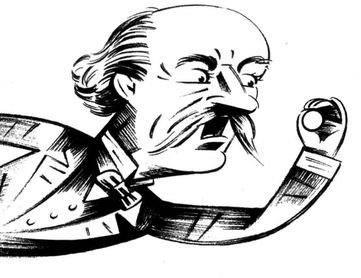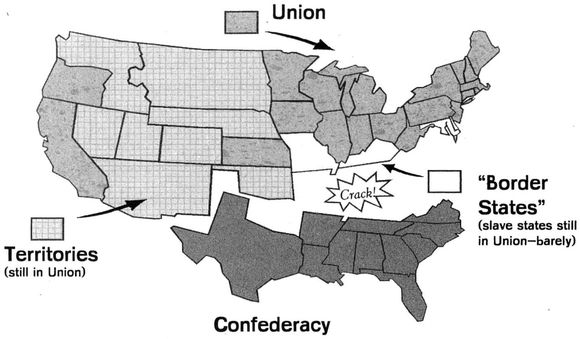Two Miserable Presidents (6 page)
Read Two Miserable Presidents Online
Authors: Steve Sheinkin

F
ort Sumter was a brick fort on a tiny island just off the coast of Charleston, South Carolina. Inside the fort were about eighty United States soldiers, commanded by Major Robert Anderson.
ort Sumter was a brick fort on a tiny island just off the coast of Charleston, South Carolina. Inside the fort were about eighty United States soldiers, commanded by Major Robert Anderson.
Outside the fort, along the Charleston waterfront, were five thousand Southern volunteers with guns and cannons pointed at Fort Sumter. These men considered the fort to be the property of the Confederate States of America. They wanted it turned over to themânow.
On his first full day as president, Lincoln faced a tricky decision. Anderson and his men in Fort Sumter were running out of food. Lincoln could give up the fort, but that would basically be admitting that South Carolina and the other Confederate states were already independent. He could send in U.S. warships, but that could easily spark shooting, and a huge war.
Any advice for the president?
Lincoln came up with a third option. He announced that he was sending in an unarmed supply ship. It would carry food but no soldiers or weapons. This was clever, because it forced Jefferson Davis to make the next tough decision. Davis could let the food into Fort Sumter, but then Anderson and his men would be there forever. He could blow the ship out of the water, but it would look pretty bad to fire on a ship that was trying to deliver food to hungry soldiers.
Davis sent new orders to General P.G.T. Beauregard, commander of the Confederate forces in Charleston. Beauregard was to demand that Robert Anderson surrender Fort Sumter immediately, before the supply ship had time to arrive. This was a little awkward for Beauregard, who had been a student in Anderson's artillery class at West Point, the U.S. military college. But Beauregard had no choice. He ordered his former teacher to surrender.
Anderson politely refused.

M
ary Chesnut was in Charleston, following the story moment by moment. “Why did that green goose Anderson go into Fort Sumter?” she wrote in her diary. “Then everything began to go wrong.” Anderson had until four a.m. of April 12 to surrender Fort Sumter. A few hours before this deadline, Chesnut was writing: “I do not pretend to sleep. How can I? If Anderson does not accept terms at four, the orders are he shall be fired upon.”
ary Chesnut was in Charleston, following the story moment by moment. “Why did that green goose Anderson go into Fort Sumter?” she wrote in her diary. “Then everything began to go wrong.” Anderson had until four a.m. of April 12 to surrender Fort Sumter. A few hours before this deadline, Chesnut was writing: “I do not pretend to sleep. How can I? If Anderson does not accept terms at four, the orders are he shall be fired upon.”
At four thirty that morning, Chesnut heard “the heavy booming of a cannon.” She jumped out of bed, said a quick prayer, then ran to the roof of her house and watched the Civil War begin.
Beauregard and his men were blasting forty cannons at Fort
Sumter, streaking the early-morning sky with orange and red. Fires broke out all over the fort, and the men inside began choking on the smoke. “The scene at this time was really terrific,” reported Captain Abner Doubleday, who was inside the fort. Soldiers were surrounded by “the roaring and crackling of the flames, the dense masses of whirling smoke, the bursting of the enemy's shells.”
Sumter, streaking the early-morning sky with orange and red. Fires broke out all over the fort, and the men inside began choking on the smoke. “The scene at this time was really terrific,” reported Captain Abner Doubleday, who was inside the fort. Soldiers were surrounded by “the roaring and crackling of the flames, the dense masses of whirling smoke, the bursting of the enemy's shells.”
Anderson and his men held out for about thirty hours, then surrendered. Amazingly, no one was killed in the fighting. But before leaving the fort, Anderson fired a salute to the American flagâa military tradition. A cannon exploded, accidentally killing Private Daniel Hough. He was the first man to die in the Civil War.
As you will see, almost nothing in this war would go as planned.
T
he Fort Sumter news spread quickly across the country. Sixteen-year-old Theodore Upson was working with his father on the family farm in Indiana when a neighbor ran up and said, “The rebs [short for rebels] have fired upon and taken Fort Sumter!”
he Fort Sumter news spread quickly across the country. Sixteen-year-old Theodore Upson was working with his father on the family farm in Indiana when a neighbor ran up and said, “The rebs [short for rebels] have fired upon and taken Fort Sumter!”
“Father got white and couldn't say a word,” Upson remembered.
That night the family sat around the dinner table, talking about what would happen next.
Grandma: Oh, my poor children in the South! Now they will suffer!
Father: They can come here and stay.
Grandma: No, they will not do that. There is their home. There they will stay. Oh, to think that I should have lived to see the day when brother should rise against brother!
Were brothers really about to fight against brothers? It sure looked like it. People in the North were furious about the Fort Sumter attack. United as never before, they poured into city streets, waving flags and shouting things like “Death to traitors!” One man at a New York City rally declared: “We shall crush out this rebellion as an elephant would trample on a mouse.”
Lincoln didn't think it would be quite that easy, but he did hope a strong show of force would help. He called on every state to send soldiers to Washington. He wanted a total of 75,000 troops to serve for ninety days.
Lincoln's call for troops united the South in the same way that the Fort Sumter attack united the North. Southerners were being told to send troops to fight against other Southerners! Not likely! Not only did Southern governors refuse the president's order, but they wrote back nasty letters, such as this one from the governor of Tennessee:
“Tennessee will furnish not a single man for the purpose of coercion
2
, but fifty thousand if necessary for the defense of our rights and those of our Southern brothers.”
2
, but fifty thousand if necessary for the defense of our rights and those of our Southern brothers.”
Just two days after his call for troops, Lincoln watched his nightmare come to lifeâmore states started dropping from the Union. Virginia seceded, followed by Arkansas, Tennessee, and North Carolina. The Confederacy now had eleven states and a new capital cityâRichmond, Virginia, just one hundred miles from Washington, D.C.
Governor Isham Harris

Both sides raced to get ready for war.

B
usting with patriotism, thousands of young men rushed to sign up for military service. “So impatient did I become for starting,” said one Arkansas man, “I felt like ten thousand pins were pricking me in every part of the body.” An Indiana man gave another reason for enlisting: “If a fellow wants to go with a girl now he had better enlist.” Everyone on both sides expected this to be a very short war, and they wanted to get in on the action before it was too late.
usting with patriotism, thousands of young men rushed to sign up for military service. “So impatient did I become for starting,” said one Arkansas man, “I felt like ten thousand pins were pricking me in every part of the body.” An Indiana man gave another reason for enlisting: “If a fellow wants to go with a girl now he had better enlist.” Everyone on both sides expected this to be a very short war, and they wanted to get in on the action before it was too late.
All over the South volunteers jumped onto trains, then shouted and sang as they rolled toward Richmond. Southern women were excited tooâeven more excited than the men, according to a young
Georgia woman, who wrote “The women of the South generally were altogether in favor of secession and of the war, if there had to be a war, and if the Southern men had not been willing to go, I reckon they would have been made to go by the women.”
Georgia woman, who wrote “The women of the South generally were altogether in favor of secession and of the war, if there had to be a war, and if the Southern men had not been willing to go, I reckon they would have been made to go by the women.”
“I wish that women could fight,” added eighteen-year-old Lucy Breckinridge of Virginia. “I would gladly shoulder my pistol and shoot some Yankees if it were allowable.”
The same wave of patriotic excitement swept through Northern towns, where eager volunteers paraded before cheering crowds. As a group of Massachusetts soldiers marched out of town on their way to Washington, family members ran out to give the boys last-minute gifts.
“Our mothersâGod bless them!âhad brought us something good to eatâpies, cakes, doughnuts, and jellies ⦠. Our young ladies, (sisters, of course) brought us ⦠needles, pins, thread, buttons, and scissors.”
Warren Goss

Warren Goss remembered that one mother actually handed her son an umbrella. Not only was this really embarrassing for the son, but it gives us an idea of how young and inexperienced these men were. Imagine a soldier bringing an umbrella into battle!
I
n an upstairs room in his Virginia home, fifty-four-year-old Colonel Robert E. Lee was pacing back and forth, trying to make up his mind. On the one hand, Lee opposed secession and slavery. And he loved the U.S. Army, in which he had served his entire adult life. On the other hand, he felt he could never fight against his home state of Virginia.
n an upstairs room in his Virginia home, fifty-four-year-old Colonel Robert E. Lee was pacing back and forth, trying to make up his mind. On the one hand, Lee opposed secession and slavery. And he loved the U.S. Army, in which he had served his entire adult life. On the other hand, he felt he could never fight against his home state of Virginia.
All over the country, people were facing the same question: Are you for the Union or the Confederacy? This question split many families in two, with some family members marching north and others heading south. The Kentucky senator John Crittenden watched one of his sons become a general in the Union army and the other become a general in the Confederate army. And how do you think Abe Lincoln felt when he heard that four of his wife's brothers were fighting for the South!
Even the United States Army was ripped in two. Soldiers who had spent years serving together now had to choose sides in the Civil War. There were plenty of teary farewell scenes as lifelong friends shook hands and hugged ⦠then marched off to fight against each other.
Robert E. Lee finally decided to resign from the U.S. Army. He walked downstairs and said sadly to his wife, “Well, Mary, the question is settled. Here is my letter of resignation.”
He gave the letter to a very disappointed General Winfield Scott, commander of the U.S. Army. Scott had been hoping Lee would take command of Union forcesâhe called Lee the very best soldier I ever saw in the field.”
“I could take no part in an invasion of the Southern states,” Lee told Scott.
“You have made the greatest mistake of your life,” Scott replied. “But I feared it would be so.”
Then Lee had to write another difficult letterâthis one to his sister, a supporter of the Union. “You must think as kindly of me as you can,” he wrote to her.
“With all my devotion to the Union, and the feeling of loyalty and duty of an American citizen, I have not been able to make up my mind to raise my hand against my relatives, my children, my home.”
Robert E. Lee

The Confederate government offered Lee command of Virginia's military forces. Lee took the job. On the train to Richmond, he looked out the window and saw crowds of people joyfully celebrating Virginia's secession. This only made him more depressed. It seemed to Lee like the whole country was going crazy.
Other books
Stolen Fate by Linsey Hall
The Remarkables (The Remarkable Owen Johnson, part 1) by Elliott, A. D.
Election by Tom Perrotta
Misery by M Garnet
The Up and Comer by Howard Roughan
Snow Storm by Robert Parker
Wings by Patrick Bishop
In the Beauty of the Lilies by John Updike
An Unlikely Friendship by Ann Rinaldi
Fuse (Pure Trilogy 2) by Baggott, Julianna